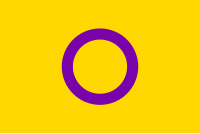Intersex human rights

Intersex human rights are about making sure that people who are born with sex characteristics that don't fit typical male or female norms are treated fairly and with respect. Just like no two people are alike, our bodies also vary. Some people have bodies that don't match what are considered male or female traits. This occurs due to genetic, hormonal, or physical differences. They might have both male and female characteristics or neither at all.
Intersex people may face discrimination, mistreatment, and stigma because their bodies don't fit into typical male or female categories. They might experience difficulties accessing healthcare or being denied employment, education or other opportunities. Because of this, intersex people are fighting for their rights to be recognized, respected, and protected.
Intersex human rights advocates are pushing for laws that recognize nonbinary genders and allow individuals to choose their own gender identity based on their lived experiences. It is important for individuals to have the freedom and autonomy to make decisions about their own bodies and how they choose to identify.
Overall, intersex human rights are about ensuring that intersex individuals are not discriminated against, have access to necessary medical care and support, and have the freedom to express their gender identity without fear of repercussions. These human rights are an important step towards achieving equality for all individuals.
Intersex people may face discrimination, mistreatment, and stigma because their bodies don't fit into typical male or female categories. They might experience difficulties accessing healthcare or being denied employment, education or other opportunities. Because of this, intersex people are fighting for their rights to be recognized, respected, and protected.
Intersex human rights advocates are pushing for laws that recognize nonbinary genders and allow individuals to choose their own gender identity based on their lived experiences. It is important for individuals to have the freedom and autonomy to make decisions about their own bodies and how they choose to identify.
Overall, intersex human rights are about ensuring that intersex individuals are not discriminated against, have access to necessary medical care and support, and have the freedom to express their gender identity without fear of repercussions. These human rights are an important step towards achieving equality for all individuals.
Related topics others have asked about:
